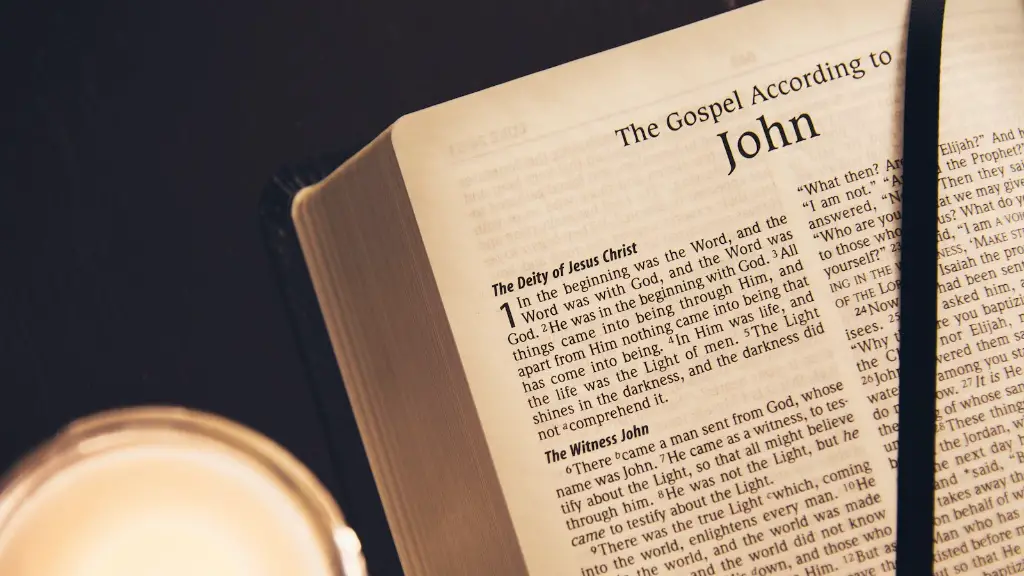As one of the oldest and most influential books in the world, the bible has long been a major source of debate in terms of its attitudes towards homosexuality. This religious book’s views on the practice of same-sex relationships have been the subject of many discussions and disagreements over the centuries and today, opinions remain wide-ranging. Despite certain interpretations, there’s a lot of confusion surrounding what exactly the bible does – or does not – say about homosexuality.
When considering the bible’s stance, it’s important to remember that the “old” testament and the “new” testament both have different sections which refer to same-sex relationships. Some advocates of biblical commentary have highlighted the fact that no single book can be used to create an authoritative opinion on the matter. There are arguments to be made from both sides in favor of and against the bible’s stance on homosexuality. Depending on which sources you believe, the bible could be seen as either denouncing the practice, or not addressing it directly at all.
In the Old Testament, some passages make references to homosexuality. Leviticus 20:13 states such relationships as an “abomination”, as does Deuteronomy 23:17. Yet, according to some interpretations of Deuteronomy 5:18, the bible does not prohibit other forms of sexual behavior completely.
The New Testament does not explicitly refer to homosexuality, though it does make reference to a “natural” family order where relationships between one man and one woman are given preference, as outlined in Matthew 19:5. This is why many have argued that the bible paints a clear picture of traditional heterosexual relationships being preferred over same-sex relationships.
Regardless of what we can learn from the bible, there is still a great deal of debate over its teaching and method of interpretation. Some religious leaders have argued that the bible is applicable to modern-day society and should be used as a guide for appropriate behavior. Others have argued that the text is no longer applicable and that the bible’s stance on homosexuality is open to individual interpretation.
It is also worth noting that many religious organizations have supported the move towards greater acceptance of same-sex relationships, with some churches now even offering special services for LGBT couples. This demonstrates how attitudes towards these matters have changed over time and how the interpretations of the bible can differ widely.
No matter what side of the argument you are on, when it comes to homosexuality, the Bible remains an inherently complex and dependant on individual interpretation.
Expert Perspectives
When it comes to exploring the bible’s teachings on homosexuality, experts from various religions have differing perspectives. Aside from interpretations of scripture, many religious leaders have argued that the New Testament, with its teachings of mercy and inclusion, can be seen as a prime example of how the bible doesn’t necessarily look down on LGBT relationships.
The Lutheran Church, for example, has published a series of study guides and documents which advocate for the inclusion of LBGT individuals into churches and places of worship. The Church of Jesus Christ of Latter-Day Saints (LDS) has also called for both members and church leaders to be tolerant and respectful of LGBT individuals.
Similarly, the United Methodist Church has largely changed its views on homosexuality, with the church now recognizing same-sex relationships as “a natural part of the human experience”. This example shows the shifts in perspectives and varying interpretations which can been seen amongst different religious organisations.
Data Analysis
Recent analysis of world religions’ attitudes towards homosexuality suggests that there has been an overall shift towards a more welcoming attitude. Studies have shown that LDS adherents now largely believe that same-sex relationships should be accepted, with support for marriage equality between LGBT couples increasing by over 10% within 10 years.
The same research indicated that the Catholic Church, oftentimes seen as the most conservative of the major world religions, has also moved towards a less hostile attitude towards the LGBT community, with support for same-sex marriage increasing from 27% in 2012 to 53% in 2017.
This indicates that there is a global move towards acceptance and recognition of LGBT individuals, and that the Bible, whilst still being open to interpretation, is no longer being used as a justification for discrimination or exclusion.
My Own Insights and Analysis
The bible is an incredibly broad and multifaceted religious text and its position on homosexuality cannot ultimately be defined by one side or the other. Although traditional interpretations would have us believe that homosexuality is against the teachings of the bible, a more subtle reading suggests that far from condemning same-sex relationships, the bible encourages us to be loving and inclusive towards everyone, no matter their sexual orientation.
In this day and age, it is more important than ever that we as a society are open to different interpretations of religious texts and relevant lifestyle choices. The bible provides a complex and nuanced view of homosexuality, and ultimately invites us to be accepting and merciful towards our fellow human beings.
Sensitivity in Interpretations
Interpreting religious texts can often be a difficult task, particularly if the text has been used to enforce certain values and attitudes for centuries. Biblical quotations can often be used to prop up an outdated, and arguably damaging, view of homosexuality and its practice.
This is why it’s important for individuals to be mindful and sensitive when discussing the bible and homosexuality. Rather than rushing to support a single interpretation of the text, it’s important to consider multiple angles and accept that one’s own interpretation may not be shared by others.
It is also important to respect the religious freedom of others and refrain from self-righteousness or judgment when discussing this sensitive topic.
Above all, it is important to remember that regardless of the bible’s stance, all human beings have the right to be treated with respect and dignity.
Emerging Views
In recent years, the discussion around LGBT rights and equality has gained traction in wider society. This has resulted in the emergence of a new generation of religious organisations and individuals, who are looking to redefine the relationship between religious beliefs and LGBT issues.
These “progressive” believers are now attempting to reconcile their faith with their stance on same-sex relationships, and see the bible as a book which encourages tolerance and acceptance of all people, regardless of their sexuality.
One example is the Metropolitan Community Church (MCC), a predominately LGBT-inclusive religious organisation which considers the bible to be an agent of change and an advocate of equal rights and inclusion.
Organisations and individuals such as MCC demonstrate how the interpretation of the bible’s teachings on homosexuality can differ greatly, and that there is room for acceptance and inclusion of the LGBT community in religious circles.
Religion and LGBT Rights
The attitudes towards LGBT relationship and rights tend to be heavily connected to religion, with many people using their religious beliefs as a basis for their stance on various issues.
Whilst religious text such as the Bible can be used to support and oppose same-sex relationships, ultimately, it is a person’s individual beliefs and values which will influence their stance on LGBT rights.
In this sense, it is important that we continue to engage and educate one another around these topics, in order to nuance our understandings of religious belief and its connections to gay rights.
It is only through this process of engaging with different perspectives, debating varied interpretations and understanding the nuances of religious belief that we can continue to move towards a future of greater acceptance and understanding.




